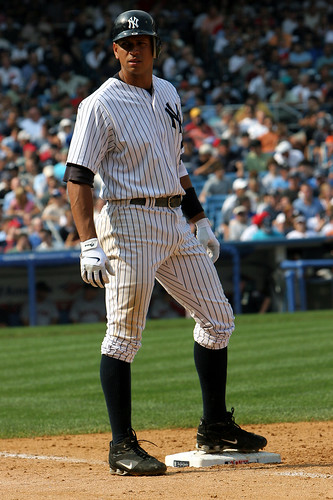I've been watching a lot of Olympics coverage. I got discouraged with Men's Soccer tournament after the highs and lows the US faced, but there's still women's soccer, Michael Phelps and the Redeem Team to get patriotic about, not to mention the novelty of watching niche sports that we only get to see once every four years, like kayaking, handball and racewalking. I even took to watching gymnastics for the first time. Watching the Chinese Men's team on the rings was vaguely similar to watching the 2007-08 New England Patriots in the sense that you got the feeling that you were watching the sport reach near perfection, and I enjoy watching anything that gets you thinking "this is something special, we may never see this done this well again."
The most controversial part of that last sentence wasn't saying I enjoyed gymnastics (it was an impressive feat of strength!), nor was it comparing great men's gymnastics to great football (I said vaguely similar), nor was it calling the 18-1 Patriots perfect (because those first few months of the season WERE football perfection... leave me alone). No, the controversial part was calling gymnastics a sport. The guys over at SportsLawBlog have been
trying to
define sport for a while now, and while I've always liked one-liners on the subject ("Sorry, Curling, but if you can play with a beer in one hand it's not a sport,") I admire the more academic approach. The sticking point against gymnastics, of course, is the "lack of objective scoring." But part of why I watched the gymnastics this year was
the new scoring system, put into place because of controversial judging decisions at the last Olympiad.
Sure, I was mostly intrigued by the societal impact of sending the message to these little girls that there is no "perfect 10." But in addition to that, the experts were saying that this system was more objective than before. The judges are given access to instant replays, both slow motion and regular speed, and allegedly there's a scoring template and rubric that all the judges are following. I, Joe American Sports Fan, can't tell what should get a tenth of a point deducted or three-tenths deducted while I watch, but I was willing to accept that the scoring
could be objective to a trained eye. At the end of the day all that comes up on the TV is the start value, one score from the judges called the execution score, and then the total of the two numbers. Start value? Objective. And just one judges' score? It sounds like an improvement...
SLB's most recent piece on the subject referenced the
women's individual all-around finals, which I actually thought had acceptable judging... But at the individual event finals, the world stood still while the judges worked through multiple tiebreakers to determine the gold medalist. Both gymnasts had the same start value and received the same score from the judges. Since gymnastics isn't allowed to give multiple golds anymore (for whatever reason), we went to tiebreakers. The first tiebreaker involved dropping the highest and lowest scores and averaging the deductions; still tied. The second tiebreaker averaged the three lowest judges scores - and
the youthful He Kexin's .933 was less than Nastia Liukin's .966. Gold to He, silver to Liukin.
Now of course, these tiebreakers are arbitrary, but all tiebreakers are arbitrary - soccer uses PKs, and the NFL effectively determines winners with a coin toss. The problem that the Olympic tiebreaker exposed is that this new judging system is just as reliant on biased judging as before. We still have a pack of judges
from non-gymnastics countries giving their own individual scores - they're just not all shown on TV. Nastia's scores ranged from 9.3 to 8.8 - and at that range, either it's at least partially subjective, or somebody's got it wrong. Referees make mistakes (
some more than others), but no self-respecting referees should differ that widely on a call. If we're going to have a panel of judges, they should work through the scoring as a panel. If one guy sees an error, they should discuss whether or not it's a deduction, and how big a deduction, and so forth. I like the idea of only one score showing up on screen, but that score shouldn't be an average of the same old biased individual scores. It should be one real consensus. I don't care if this takes longer, just like I don't care if instant replay slows down NFL games. What's important in sports is making the right call.
If gymnastics can prove that there
is a right call - that the scoring can truly be objective and not simply a beauty contest of competing personal preferences - then it should do everything in its power to prove it. That means getting judges from countries who have gold-medal histories in the sport, and having them objectively agree on what the score should be. Until then, as far as I'm concerned, gymnastics will rejoin diving, equestrian and ice dancing on the list of non-sports at the Olympics that I'll watch in passing for amusement while I wait for the actual sports.

